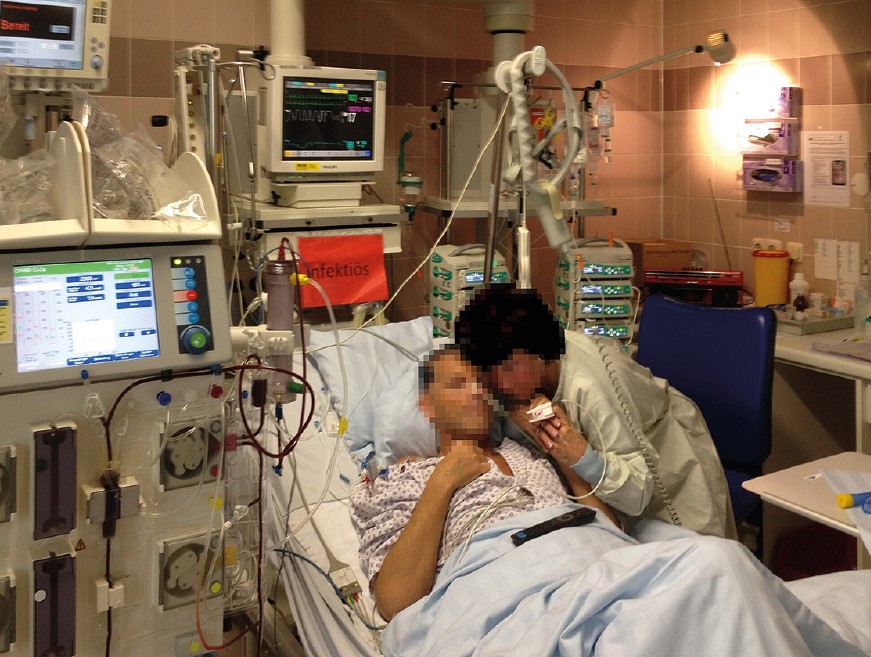WOULDN’T WE ALL love to live in a world free, at last, from the curse of famine, sickness and disease? No more reports of an overwhelmed health service. No more need for continual pleas for research funding to combat cancer, heart disease, dementia, Alzheimer’s and countless other disabilities and diseases.
Well, the good news is that one day that will be the situation. It sounds impossible I know. But according to God’s promises in the Bible’s Old Testament, and the Gospel preached by Jesus Christ in the New Testament, a new government will be established on this Earth. A worldwide government, which the Bible calls the “Kingdom of God” or the “Kingdom of Heaven”—Jesus Christ himself being the immortal King.
Preaching With Power
Jesus preached the ‘gospel of the kingdom’. He not only preached the Kingdom, he demonstrated it in action. His Father had given him the authority and power to heal and cure all manner of sickness and disease, and even the power to raise the dead.
Take for example, the inspired account in the Gospel record of Matthew:
And he went throughout all Galilee, teaching in their synagogues and proclaiming the gospel of the kingdom and healing every disease and every affliction among the people. So his fame spread throughout all Syria, and they brought him all the sick, those afflicted with various diseases and pains, those oppressed by demons, epileptics, and paralytics, and he healed them. And great crowds followed him from Galilee and the Decapolis, and from Jerusalem and Judea, and from beyond the Jordan (Matthew 4:23–25).
It was indeed his power to perform miracles, including feeding the hungry and healing both physical and mental illnesses, that proved him to be the Son of the Creator, the Christ, the Messiah and the anointed King of the Kingdom to come.
On one occasion John the Baptist, who had baptised Jesus in the river Jordan and had since been imprisoned by Herod, sent some of his followers to Jesus to ask a question:
Now when John heard in prison about the deeds of the Christ, he sent word by his disciples and said to him, “Are you the one who is to come, or shall we look for another?” And Jesus answered them, “Go and tell John what you hear and see: the blind receive their sight and the lame walk, lepers are cleansed and the deaf hear, and the dead are raised up, and the poor have good news preached to them. And blessed is the one who is not offended by me” (Matthew 11:2–6).
The miraculous power to heal the sick was a sign, a confirmation, that the message he brought to the poor and to those who would listen was true and reliable and was indeed the word of God Himself.
A Taste of The Kingdom
After Christ’s resurrection from death and ascension to heaven, his authority was confirmed by the apostles. They were eyewitnesses of the power that was displayed by Christ during his ministry, and of his resurrection from the dead. This is what Peter said:
Men of Israel, hear these words: Jesus of Nazareth, a man attested to you by God with mighty works and wonders and signs that God did through him in your midst, as you yourselves know… (Acts 2:22).
Each miracle, each act of healing was a sign, a representation, a taste of the powers which will be available in the Kingdom to come. Here was Jesus the King, with the power and authority of the Creator, in the land his Father has selected to be at the centre of His government in the age to come. In these things there was a foretaste of the Kingdom of God. So much so that Jesus during his ministry said, ‘the kingdom of God is in the midst of you’ (Luke 17:21). In his miracles and teaching was a preview of the future Kingdom, a Kingdom which he taught his followers to pray for (Matthew 6:10) and to seek above all else (v. 33).
The Sickness of Sin
More important was that each act of healing was actually a sign and a demonstration of God’s power to heal and deliver us from a much greater sickness and a fatal disease. A disease which affects us all—a spiritual plague, a pandemic, which is at the root of our individual mortality and is the source of all the world’s problems.
This inherent disease is embedded in our very nature from the moment we are born. God calls this disease ‘the law of sin’ (Romans 7:23). Not a popular idea in our times, but it is evident in nearly every aspect of our personal life and beyond. As God says: ‘All have sinned and fall short of the glory of God’ (Romans 3:23).
Mercifully, there is a limit to the time we have to endure the consequences of our own sin and the pain and impact of the common selfishness, greed, disloyalty, dishonesty, cruelty, violence and wars that we see in the world all around us. At the moment we are sinners and therefore mortal. But the good news is that Jesus Christ will return soon. And just as he was able to heal physical and mental sicknesses and disease in his first ministry, so he has the power and authority to forgive our sins now, and to raise us from death and give us the gift of eternal life in his Kingdom yet to come. ‘For the wages of sin is death, but the free gift of God is eternal life in Christ Jesus our Lord’ (Romans 6:23).
The Power to Heal
Let’s consider one notable occasion, on which Jesus demonstrated that he had the authority to heal a paralysed man. A man incapable of delivering himself from the dreadful disease and disability which had ruined his life; a man who had to be brought to Jesus by his friends. Those friends believed that Jesus could, and would, heal him. Jesus showed that his power was not limited to healing his physical disease but, more importantly, he had been given the authority to forgive sins. The power to heal the man’s paralysis was evidence of Jesus’ authority to forgive.
And behold, some men were bringing on a bed a man who was paralysed, and they were seeking to bring him in and lay him before Jesus, but finding no way to bring him in, because of the crowd, they went up on the roof and let him down with his bed through the tiles into the midst before Jesus. And when he saw their faith, he said, “Man, your sins are forgiven you.” And the scribes and the Pharisees began to question, saying, “Who is this who speaks blasphemies? Who can forgive sins but God alone?” When Jesus perceived their thoughts, he answered them, “Why do you question in your hearts? Which is easier, to say, ‘Your sins are forgiven you’, or to say, ‘Rise and walk’? But that you may know that the Son of Man has authority on earth to forgive sins”—he said to the man who was paralysed—“I say to you, rise, pick up your bed and go home.” And immediately he rose up before them and picked up what he had been lying on and went home, glorifying God. And amazement seized them all, and they glorified God and were filled with awe, saying, “We have seen extraordinary things today” (Luke 5:18–26).
The scribes and Pharisees were the religious leaders at that time. They did not believe that Jesus had the authority to forgive sins, but the miracle of healing proved them wrong. Moreover, the scribes and Pharisees generally believed they were good and righteous already, and they didn’t need the forgiveness Jesus offered. He told them something very important:
Jesus answered them, “Those who are well have no need of a physician, but those who are sick. I have not come to call the righteous but sinners to repentance” (vs. 31–32).
Jesus was saying something that may seem obvious: those who think they are healthy don’t need or seek a doctor. We only go to the doctor when we recognize that we have an illness or that there is something wrong with us. Only then can the sickness be dealt with. Unfortunately, there are many who don’t realise when they are seriously ill, until it’s too late. Likewise, it’s only those who recognize that they are sinners who will come to Jesus for healing. This is true for us all. Only when we acknowledge that we are smitten with the disease of sin will we come to Jesus for forgiveness. Only then can he heal us.
The Apostle John puts it very clearly: ‘If we say we have no sin, we deceive ourselves, and the truth is not in us. If we confess our sins, he is faithful and just to forgive us our sins and to cleanse us from all unrighteousness. If we say we have not sinned, we make him a liar, and his word is not in us’ (1 John 1:8–10).
God requires that we hear what He says, believe His word, have faith in His promises, and listen to His Son. If we acknowledge our sins by being baptised and seek to change the direction of our lives we can have hope of being raised from the dead and being citizens of the future Kingdom of God. We’ll consider this further in the next article.
The Time of Healing
The good news is that God has promised that He will send His son to earth again. Jesus the King will rule the world with authority, power, righteousness and a justice which will at last bring healing and peace. Then the famines, illnesses, diseases and other disasters which curse the earth now will be eradicated for ever. Ultimately even sin and death will be things of the past. Jesus demonstrated at his first coming that he has the power to feed the hungry, heal the sick, and bring soundness to those who have troubled and tormented minds. When he returns, those who have acknowledged their personal need to be cured from the curse of sin and death will receive that cure. It will involve a change of nature and being made like the resurrected Lord Jesus, the Son of God, their King.
Hear the good news, summarised by God, in the promise we can read in the last pages of the Old Testament: ‘For you who fear my name, the sun of righteousness shall rise with healing in its wings. You shall go out leaping like calves from the stall’ (Malachi 4:2).
Again, in the final chapters of the New Testament the promise is repeated: ‘He will wipe away every tear from their eyes, and death shall be no more, neither shall there be mourning, nor crying, nor pain any more, for the former things have passed away’ (Revelation 21:4).
Good news indeed!
Steven Robinson






